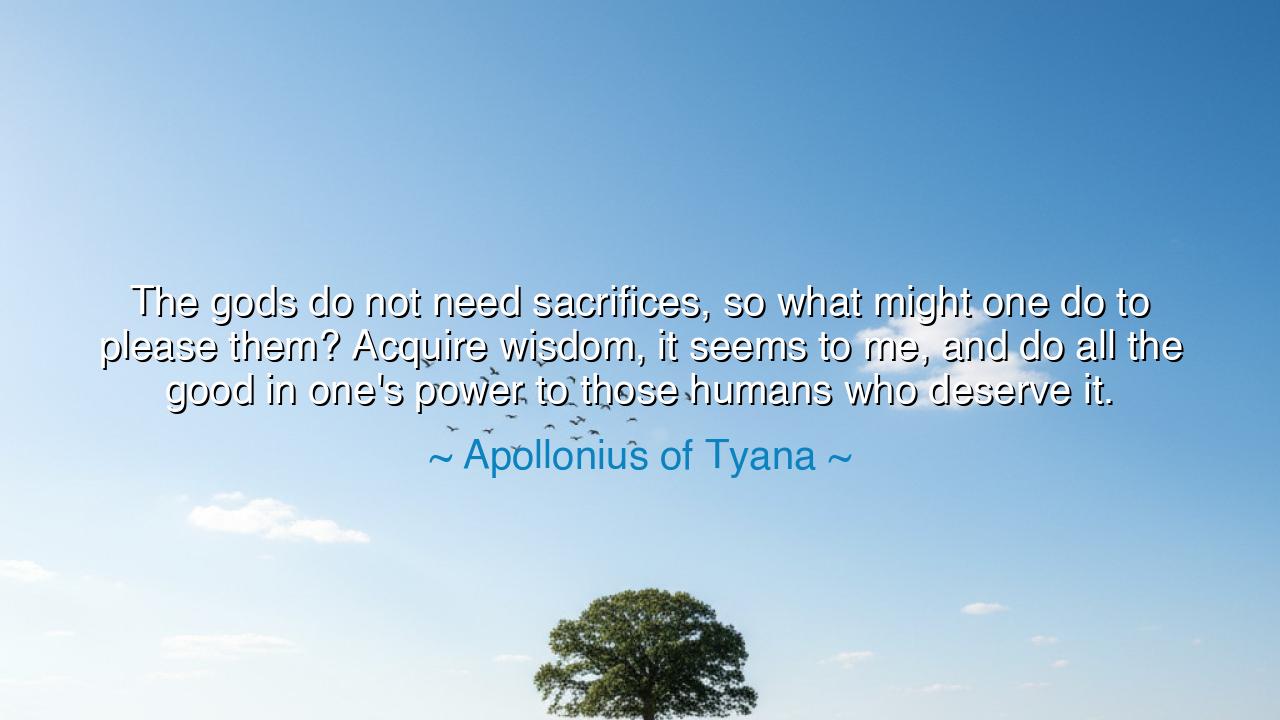
The gods do not need sacrifices, so what might one do to please
The gods do not need sacrifices, so what might one do to please them? Acquire wisdom, it seems to me, and do all the good in one's power to those humans who deserve it.






In this profound teaching, Apollonius of Tyana speaks against the shallow rituals that many believed could win the favor of the gods. In the ancient world, men offered sacrifices of animals, gold, and incense, hoping to please divine beings. Yet Apollonius declares that the divine needs none of these things, for what are material gifts to those who are eternal? Instead, he reveals a higher path: to acquire wisdom and to do good to those among mankind who are worthy. In these words, he shifts the focus from outward displays of piety to the inward cultivation of virtue.
The origin of this wisdom comes from Apollonius’s life as a philosopher and mystic during the Roman Empire. Born in a time when religious rituals were grand and often politically motivated, he traveled the known world seeking truth beyond the corruption of temples and courts. His words echo the teachings of other sages, such as Socrates, who also rejected hollow rites in favor of inner knowledge and justice. For Apollonius, the true offering to the gods was not blood spilled upon an altar, but a life lived in harmony with divine principles.
History itself confirms the power of this teaching. In ancient Athens, there was a ruler named Pisistratus who maintained his authority by staging elaborate sacrifices and public displays to convince the people of his divine favor. Yet when the city fell into decay, it was not the abundance of offerings that restored it, but the rise of wise leaders like Solon, who reformed laws and sought justice for the common man. This mirrors Apollonius’s belief: the gods are honored not by ceremonies, but by the acts of humans who bring balance and good into the world.
The emphasis on helping those who deserve it carries deep weight. Apollonius teaches that goodness is not blind charity, but the careful discernment of where our efforts will bear fruit. Just as a farmer must choose healthy soil for his seeds, so must a wise person direct their kindness to those who will nurture it and spread it further. This is not harshness, but strategy, ensuring that goodness multiplies rather than being squandered.
Ultimately, this quote is a call to inner transformation. It tells us that the highest worship is not the burning of incense or the chanting of prayers, but the daily work of seeking wisdom, living justly, and lifting others who walk the same path. Apollonius’s words echo across the centuries as a timeless truth: the divine does not need our offerings, but humanity desperately needs the light of our actions. Let this lesson be carried forward, so that future generations may understand that true devotion is measured not by what we give to the heavens, but by what we give to one another.






AAdministratorAdministrator
Welcome, honored guests. Please leave a comment, we will respond soon